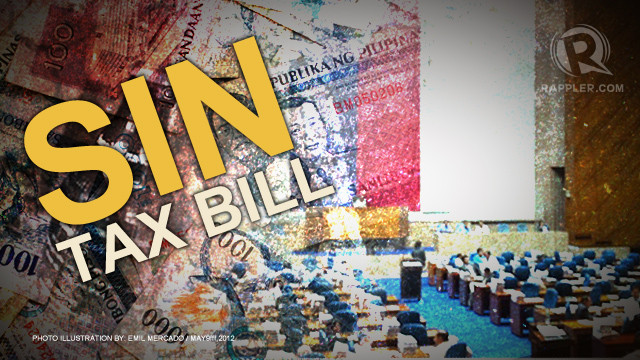SUMMARY
This is AI generated summarization, which may have errors. For context, always refer to the full article.

MANILA, Philippines – The cigarettes and some alcohol products sold in the Philippines are the lowest in the world. But that could change if Congress can make progress with efforts to reform the current excise tax structure on “sin” products.
The industries involved–tobacco and alcohol–are a traditional political economy playground since the legislated tax system is the key factor that makes the products affordable. Taxes also tend to discriminate other players and reward a few existing ones.
Lobbying for and against any reform efforts is at its finest, too.
So far, the Palace-backed sin tax amendments under House Bill 5727 has been gaining ground in the House of Representatives after it was watered down.
It is now on second reading at the House of Representatives and is being rushed to be passed before the lawmakers go on recess this week and before President Aquino’s State of the Nation Address in July.
These are what you need to know about the sin tax reform efforts:
1. Inflation and tiered taxing
Current deliberations in Congress are focused on different permutations of two key issues:
- the 4-tiered tax system
- base price for the “sin” products
First, the proponents of reform efforts want to simplify the current 4-tiered system, which was designed to favor local brands, particularly those produced by previously Lucio Tan-led firms.
With multi-tiered tax levels, the brands that are categorized under a higher bracket are taxed more, while those that are local are taxed less. This system had previously resulted in a strong duopoly: local firm Fortune Tobacco and multinational Philip Morris. They later cozied up as joint venture partners resulting in a near-monopoly of over 90% of the local market that has brands in all 4 tiers.
Staunch sin tax reform movers claim that keeping a 4-tier system results in more low-end brands that tend to be more destructive to health.
Current deliberations in the House involve debates on as much as 700% increase in tax rates for low-end products.
The tiered system, however, is best accompanied by the second focus: indexing the base price of the sin product to inflation.
This basically means the price of cigarettes and alcohol products used as a base in computing the sin tax has to reflect the yearly fluctuations, which are reflected in the inflation rates.
Currently, the base price of sin products are frozen to 1996 prices. This means a pack of cigarettes that costs P4.50 in 1995 is taxed only P2.72 up to now. If this is indexed to inflation, the same cigarettes could now cost P5.50 and its taxes would be more than P2.72.
2. More revenues and address health issues
The government needs the additional revenues to boost–and improve a future precarious–fiscal situation. The difference between how much the government collects as revenues and taxes, and the amount it spends on social services, education, etc has to be manageable so the Philippines will not go the way of debt-ridden Greece.
A healthy fiscal situation also translates to lesser government borrowings. (Already, the Philippines is one of the most active debt issuers in the world. Recent official data show that each Filipino, regardless of age, owes P51,675 in foreign and domestic debt.)
As a strategy to make the pro-sin tax amendments more palatable, the government has promised to set aside a big chunk of the additional revenues for universal health care. After all, smoking cigarettes and drinking alcohol are the reasons behind the country’s top killer diseases, including lung cancer and heart attack.
3. Pro vs. anti
The Aquino government has decided to drop all its other revenue-generating measures so it could focus on the sin tax reforms.
Finance Secretary Cesar Purisima has said they are “confident” the sin tax reforms will make it through the political and legislative process.
President Aquino, himself a smoker, has included the sin tax reforms among its priority measures.
Former finance officials, interest groups, and health advocates have thrown their support behind the Palace-backed House Bill 5727, also known as the Abaya Bill.
However, the influential North Luzon Alliance, which consists of lawmakers in Congress who come from tobacco-producing regions, has said these efforts will result in job losses and the demise of the tobacco industry.
Executives of Philip Morris Fortune Tobacco Corp have said they will abide by the law, but added these reforms may further exacerbate smuggling of illegal products.
Another multinational cigarette maker, British American Tobacco, which was “punished” by the 4-tiered tax system for having foreign brands, is all-out in supporting the reform moves, saying this provides for a level playing field. – Rappler.com
Click on the links below for related stories.
Add a comment
How does this make you feel?
There are no comments yet. Add your comment to start the conversation.